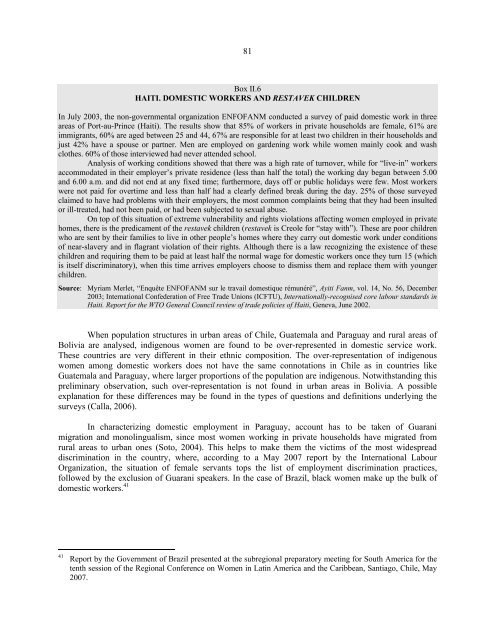Women in Latin America and the Caribbean - Cepal
Women in Latin America and the Caribbean - Cepal
Women in Latin America and the Caribbean - Cepal
Create successful ePaper yourself
Turn your PDF publications into a flip-book with our unique Google optimized e-Paper software.
81<br />
Box II.6<br />
HAITI. DOMESTIC WORKERS AND RESTAVEK CHILDREN<br />
In July 2003, <strong>the</strong> non-governmental organization ENFOFANM conducted a survey of paid domestic work <strong>in</strong> three<br />
areas of Port-au-Pr<strong>in</strong>ce (Haiti). The results show that 85% of workers <strong>in</strong> private households are female, 61% are<br />
immigrants, 60% are aged between 25 <strong>and</strong> 44, 67% are responsible for at least two children <strong>in</strong> <strong>the</strong>ir households <strong>and</strong><br />
just 42% have a spouse or partner. Men are employed on garden<strong>in</strong>g work while women ma<strong>in</strong>ly cook <strong>and</strong> wash<br />
clo<strong>the</strong>s. 60% of those <strong>in</strong>terviewed had never attended school.<br />
Analysis of work<strong>in</strong>g conditions showed that <strong>the</strong>re was a high rate of turnover, while for “live-<strong>in</strong>” workers<br />
accommodated <strong>in</strong> <strong>the</strong>ir employer’s private residence (less than half <strong>the</strong> total) <strong>the</strong> work<strong>in</strong>g day began between 5.00<br />
<strong>and</strong> 6.00 a.m. <strong>and</strong> did not end at any fixed time; fur<strong>the</strong>rmore, days off or public holidays were few. Most workers<br />
were not paid for overtime <strong>and</strong> less than half had a clearly def<strong>in</strong>ed break dur<strong>in</strong>g <strong>the</strong> day. 25% of those surveyed<br />
claimed to have had problems with <strong>the</strong>ir employers, <strong>the</strong> most common compla<strong>in</strong>ts be<strong>in</strong>g that <strong>the</strong>y had been <strong>in</strong>sulted<br />
or ill-treated, had not been paid, or had been subjected to sexual abuse.<br />
On top of this situation of extreme vulnerability <strong>and</strong> rights violations affect<strong>in</strong>g women employed <strong>in</strong> private<br />
homes, <strong>the</strong>re is <strong>the</strong> predicament of <strong>the</strong> restavek children (restavek is Creole for “stay with”). These are poor children<br />
who are sent by <strong>the</strong>ir families to live <strong>in</strong> o<strong>the</strong>r people’s homes where <strong>the</strong>y carry out domestic work under conditions<br />
of near-slavery <strong>and</strong> <strong>in</strong> flagrant violation of <strong>the</strong>ir rights. Although <strong>the</strong>re is a law recogniz<strong>in</strong>g <strong>the</strong> existence of <strong>the</strong>se<br />
children <strong>and</strong> requir<strong>in</strong>g <strong>the</strong>m to be paid at least half <strong>the</strong> normal wage for domestic workers once <strong>the</strong>y turn 15 (which<br />
is itself discrim<strong>in</strong>atory), when this time arrives employers choose to dismiss <strong>the</strong>m <strong>and</strong> replace <strong>the</strong>m with younger<br />
children.<br />
Source: Myriam Merlet, “Enquête ENFOFANM sur le travail domestique rémunéré”, Ayiti Fanm, vol. 14, No. 56, December<br />
2003; International Confederation of Free Trade Unions (ICFTU), Internationally-recognised core labour st<strong>and</strong>ards <strong>in</strong><br />
Haiti. Report for <strong>the</strong> WTO General Council review of trade policies of Haiti, Geneva, June 2002.<br />
When population structures <strong>in</strong> urban areas of Chile, Guatemala <strong>and</strong> Paraguay <strong>and</strong> rural areas of<br />
Bolivia are analysed, <strong>in</strong>digenous women are found to be over-represented <strong>in</strong> domestic service work.<br />
These countries are very different <strong>in</strong> <strong>the</strong>ir ethnic composition. The over-representation of <strong>in</strong>digenous<br />
women among domestic workers does not have <strong>the</strong> same connotations <strong>in</strong> Chile as <strong>in</strong> countries like<br />
Guatemala <strong>and</strong> Paraguay, where larger proportions of <strong>the</strong> population are <strong>in</strong>digenous. Notwithst<strong>and</strong><strong>in</strong>g this<br />
prelim<strong>in</strong>ary observation, such over-representation is not found <strong>in</strong> urban areas <strong>in</strong> Bolivia. A possible<br />
explanation for <strong>the</strong>se differences may be found <strong>in</strong> <strong>the</strong> types of questions <strong>and</strong> def<strong>in</strong>itions underly<strong>in</strong>g <strong>the</strong><br />
surveys (Calla, 2006).<br />
In characteriz<strong>in</strong>g domestic employment <strong>in</strong> Paraguay, account has to be taken of Guarani<br />
migration <strong>and</strong> monol<strong>in</strong>gualism, s<strong>in</strong>ce most women work<strong>in</strong>g <strong>in</strong> private households have migrated from<br />
rural areas to urban ones (Soto, 2004). This helps to make <strong>the</strong>m <strong>the</strong> victims of <strong>the</strong> most widespread<br />
discrim<strong>in</strong>ation <strong>in</strong> <strong>the</strong> country, where, accord<strong>in</strong>g to a May 2007 report by <strong>the</strong> International Labour<br />
Organization, <strong>the</strong> situation of female servants tops <strong>the</strong> list of employment discrim<strong>in</strong>ation practices,<br />
followed by <strong>the</strong> exclusion of Guarani speakers. In <strong>the</strong> case of Brazil, black women make up <strong>the</strong> bulk of<br />
domestic workers. 41<br />
41<br />
Report by <strong>the</strong> Government of Brazil presented at <strong>the</strong> subregional preparatory meet<strong>in</strong>g for South <strong>America</strong> for <strong>the</strong><br />
tenth session of <strong>the</strong> Regional Conference on <strong>Women</strong> <strong>in</strong> Lat<strong>in</strong> <strong>America</strong> <strong>and</strong> <strong>the</strong> <strong>Caribbean</strong>, Santiago, Chile, May<br />
2007.











